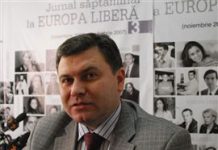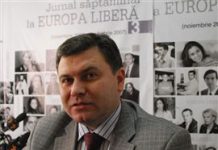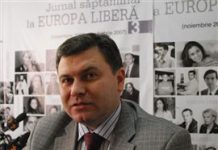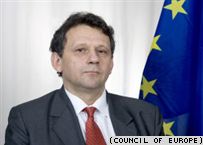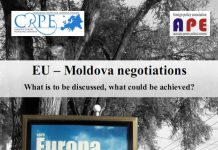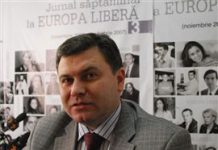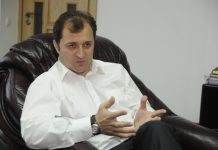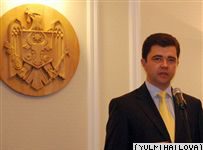APE staff
Alina Turcanu: Ukraine supports the policy of small steps regarding Transnistrian problem. Timpul.md. 21/10/2010.
Ukrainian authorities hope that formal negotiations on the Transnistrian issue in the "5+2" format, stopped in 2006, will be resumed after the election of a new Parliament of Republic of Moldova. Until then, officials in Kiev encourage Chisinau and Tiraspol to continue with the small steps policy”. However, Ukrainian officials believe that the Moldovan-Ukrainian bilateral dialogue is sluggish because of Chisinau.
Niemann, Arne; de Wekker, Tessa: Normative power Europe? EU relations with Moldova. European Integration...
This article analyses the extent to which the European Union (EU) constitutes a normative power in its relations with Moldova. ‘Normative power Europe is examined along three dimensions: (i) normative intent; (ii) normative process; and (iii) normative impact. Our empirical analysis focuses on two norms: democracy and good governance. In addition, we ask how ‘normatively the EU has acted regarding a solution to the Transnistrian conflict. On the basis of our three-dimensional framework, we find that EU normative power can be judged as only moderate in EU-Moldovan relations.
KIEV IN FALL. Novaya Online Gazeta Transnistria. APE, Transnistrian Dialogues. 20.10.2010
In the morning on the 15th of October we went to the Ukrainian Foreign Ministry, where an old acquaintance was already expecting us - a former employee of the Embassy of Ukraine in the Republic of Moldova, Marco Shevchenko. Now, his place of work is the Political and Security Department of the Ministry of Foreign Affairs.
Radoslaw Sikorski, Carl Bildt Letter to Catherine Ashton and Stefan Fule
Eastern Partnership
Press release APE, Victor Chirila: Republic of Moldova’s foreign policy under the aegis of...
During the first year of Alliance for European Integration government, Republic of Moldova's foreign policy has been characterized by dynamism, initiative, intelligence and consistency. Moldovan diplomacy has able to capitalize effectively on the unified and strong political will expressed by the AEI in the area of European integration and to make the maximum out of the openness and confidence expressed by the EU and its Member States to the new democratic and pro-European government in Chișinău.
U.S. Statement on EU Representative for Moldova at OSCE. America.gov. 23.09.2010.
United States Mission to the OSCE
Response to Kalman Mizsei,
EU Special Representative
for the Republic of Moldova
As delivered by Ambassador Ian Kelly
to the Permanent Council, Vienna
September 23, 2010
Interview with Dan Dungaciu: Republic of Moldova’s European vector from the point of view...
*Transcript of a radio broadcast, from September 5th2010, produces by the Foreign Policy Association (APE) in collaboration with Imedia News and Analysis Agency and with the assistance of the German Foundation Friedrich Ebert Stiftung (FES). The broadcast is aired on Radio Vocea Basarabiei every Sunday.
Interview with Victor Chirila and Nicu Popescu: Impact of recent tensions between Chisinau and...
The theme of our program today will be devoted to Republic of Moldova's relations with the Russian Federation taking into account that some elements of tension have recently emerged in the relations between Chisinau and Moscow. Our guests in the studio are Mr. Nicu Popescu, Advisor to the Prime Minister on foreign policy matters and Mr. Victor Chirilă, Executive Director of the Foreign Policy Association. Hello and welcome to our program!
Victor Chirila: Moldovan-Russian pragmatism sank in Moldovan wine at Solntzevo. Timpul. 22.07.2010.
(This commentary was published in Moldovan newspaper TIMPUL on July 22, 2010)
Interview with Andrei Popov: Republic of Moldova’s relations with Ukraine, Russia, Romania: developments and...
n today's show I would like to present you a discussion with Mr. Andrei Popov, Deputy Minister of Foreign Affairs and European Integration. In today's discussion we shall cover issues regarding Republic of Moldovas relations with Ukraine, Russia and Romania. So, lately discussions about part of the Odessa-Reni road, crossing Republic of Moldova near the village of Palanca, Stefan Voda district, have once again caught the attention of public opinion. Although joint expert groups appear to have reached an agreement on Palanca dossier, certain political forces in Kiev, said that the deal would prejudice the interests of Ukraine and even called for creating a special commission in the Ukrainian Rada.
Alexandru Baltag, Associated Expert, APE: “Russian energetic weapon as an instrument of pressure and...
Ukraine and Republic of Moldova, which have not existed as independent states by the Soviet implosion, represented the European interface first of the Russian Empire and then of the Soviet Empire. In these circumstances, this territory, particularly the Ukrainian one, has the role of geopolitical pivot, because the existence of these states as independent by the Kremlin (independent in the strict sense of the word) contributes to Russia's geopolitical transformation. An eventual join of these two countries to the EU and NATO could push Russia in Asia in such a way that the relations between Russia and Europe will be related only to the economic and energetic domain. This fact is perceived as a threat for the Russian Federation, as long as it has played and plays a (geo)political and (geo)strategic role of dominance in Europe during the recent centuries.
Victor Chirila: AEI between to be or not to be. Info-Prim Neo. 02.07.2010.
On June 28, 2010, after Acting President Mihai Ghimpu issued a decree, the Moldovan people could officially commemorate, for the first time, the occupation of Bessarabia by the Soviet troops on June 28, 1940. The commemoration of this tragic event in our history should have generated a moment of national unity. Regretfully, it rekindled the political and historical divisions/disagreements that have absorbed the energy of the society, the political class, for over 20 years.
Kalman Mizsei: In the Transnistrian settlement process interests of both Chisinau and Tiraspol are...
Interview with European Union Special Representative for Moldova Kalman Mizsei.
Ratification of the Rome Statute of the International Penal Court: an imperative issue on Moldovas...
To investigate the most heinous crimes of the twentieth century - genocide, crimes against humanity and war crimes, the international community has set up ad hoc tribunals such as the International Military Tribunals at Nuremberg and Tokyo, the International Criminal Tribunal for Rwanda and the International Criminal Tribunal for former Yugoslavia. However, genocide, crimes against humanity and war crimes remain a grim reality of the world today. Thus, on July 17, 1998, the Rome Diplomatic Conference adopted the Rome Statute of the International Criminal Court (ICC) with the aim of creating a permanent and competent international court designed to prosecute people who have committed the most heinous crimes known to humanity. Thereby, the International Criminal Court differs from the International Court of Justice, sometimes called the World Court, which settles disputes between governments. Rome Statute of the ICC entered into force on July 1, 2002 and the Court is fully operational, having its seat in Hague, the Netherlands. The treaty was welcomed and appreciated by governments, legal experts and civil society as the most significant achievement in international law since the adoption of United Nations Charter. In this way, the struggle for international justice has made a major breakthrough.
Interview with Victor Chirila and Iulian Fruntasu: Negotiations on liberalization of visa regime between...
Corneliu RUSNAC: Today we are going to discuss about the negotiations on liberalization of visa regime between Republic of Moldova and the EU which is to be launched on June 15th in Luxembourg within the Republic of Moldova-EU Cooperation Committee. Our guests in the studio are Mr. Iulian Fruntașu, Advisor to the Prime Minister on policy issues and Mr. Victor Chirilă, Executive Director of the Foreign Policy Association. Hello!
Interview with Vlad Filat: Government has ensured Moldova’s survival and started its development. Infotag....
Moldovan Prime Minister Vlad Filat
Interview with Victor Osipov: Results of the bilateral consultations tour on the transnistrian issue....
In today's show I would like to present you a discussion with Mr. Victor Osipov, Deputy Prime Minister, responsible within the government for the settlement of the transnistrian problem. Recently Victor Osipov visited Brussels and Washington where he met senior officials from EU and U.S. I asked Mr. Osipov what was the purpose and what were the results of these visits?



